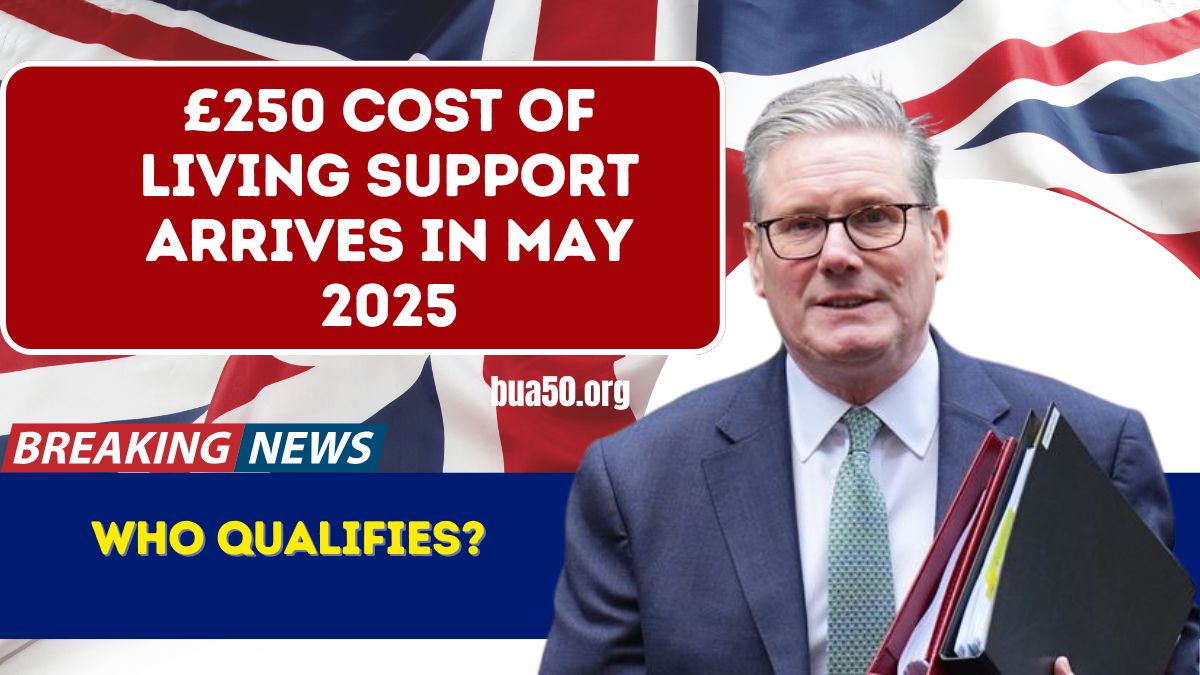UK £250 Cost of Living Payment in May 2025: How to Check Your Eligibility
With millions across the UK continuing to feel financial pressure, the government has announced a one-time £250 payment to assist the most vulnerable households. Scheduled to roll out in April 2025, this support comes under the extended Household Support Fund (HSF), which is now confirmed to continue through to March 2026.
Rising living costs and ongoing high inflation have made essentials like food, energy, and transport harder to afford. This payment is part of a larger effort to help those most affected manage their daily expenses more easily.
Who Will Qualify for the April 2025 £250 Payment?
This £250 payment is designed for households facing serious financial challenges. Different groups have different eligibility requirements:
| Detail | Information |
|---|---|
| Payment Amount | £250 |
| Payment Date | April 2025 |
| Program | Household Support Fund (extended to March 2026) |
| Who Qualifies | Low-income households, benefit recipients, pensioners, disabled individuals |
| Application Method | Automatic for some; manual for others through local councils |
Benefit Recipients
If you are receiving means-tested benefits such as Universal Credit, Jobseeker’s Allowance (JSA), Income Support, Employment and Support Allowance (ESA), Tax Credits, or Pension Credit, you are likely to get the £250 payment automatically. There’s no need for extra action — it will be paid directly.
Pensioners Receiving Pension Credit
Older individuals who currently receive Pension Credit will also get the payment automatically. Pension-age people who haven’t yet applied for Pension Credit are encouraged to do so because it can open up not only this payment but additional help like discounted energy bills and council tax reductions.
People with Disabilities
Those receiving disability benefits — like Personal Independence Payment (PIP), Disability Living Allowance (DLA), or Attendance Allowance — may also qualify. Some councils might ask for extra paperwork, depending on their rules, so it’s important to check local guidelines.
Low-Income Households Not on Benefits
Even if you’re not claiming formal benefits, you could still qualify if you are on a low income and have less than £2,000 in savings. Councils will assess your financial situation, looking at your monthly earnings, household size, and housing costs like rent or mortgages to decide if you’re eligible.
Distribution Methods for the £250 Payment
| Distribution Method | Eligible Group | Action Required |
|---|---|---|
| Automatic Payment | Benefit recipients and Pension Credit claimants | No action needed |
| Manual Application | Low-income households not on benefits | Apply through local council |
How to Apply If You’re Not Receiving Benefits
If you aren’t automatically eligible and need to apply manually, follow these simple steps:
-
Organize Your Finances: Collect information about your income, expenses, and savings.
-
Find Your Council: Use the council locator tool at gov.uk to identify your local authority.
-
Go to the HSF Page: Visit the Household Support Fund page on your council’s website.
-
Gather Your Documents: You’ll need proof of ID, bank statements, utility bills, and rent or mortgage agreements.
-
Complete the Application: Fill out the form online and upload all requested documents.
-
Await Response: Councils usually take between 2 to 6 weeks to review and process applications.
What Is the Household Support Fund?
Originally launched in 2021 as a temporary measure to ease pandemic-related hardship, the Household Support Fund has now become a key part of long-term financial aid. With its new extension to March 2026, the fund is a vital tool for helping families manage inflation and the high cost of living.
Although the funding is provided nationally, local councils are given the flexibility to set specific eligibility rules, allowing them to tailor the support to meet the unique needs of their communities.
Other Financial Help Available in 2025
In addition to the £250 payment, there are several other support schemes still available:
-
Winter Fuel Payment: Between £250 and £600 for eligible pensioners to help with heating costs.
-
Cold Weather Payment: £25 weekly for each period of extremely cold weather.
-
Warm Home Discount: Reduces electricity bills by £140 for qualifying households.
-
Council Tax Support: Discounted council tax based on household income and size.
These programs can be combined to offer even greater financial stability for those who need it most.
Why the £250 Payment Matters in May 2025
Even though inflation has eased slightly compared to the highs of 2023 and 2024, the prices of essentials like rent, food, utilities, and travel have remained stubbornly high in May 2025. Many households are still struggling with the lingering effects of previous financial crises.
The £250 payment isn’t just a short-term fix; it shows that the government continues to recognize and address the needs of vulnerable groups. With local councils handling the distribution, the support can be more targeted, though requirements and processes might differ depending on where you live.
Conclusion
The £250 one-time payment due in April 2025 is a crucial part of the UK’s broader effort to provide financial relief to vulnerable citizens. Along with the extended Household Support Fund and other ongoing assistance programs, it helps build a stronger safety net for low-income and struggling households. Staying informed about your local council’s rules and applying early if needed will be essential to ensuring that you don’t miss out on this important support.
FAQ
Who automatically qualifies for the £250 payment?
Those who already receive means-tested benefits like Universal Credit, or Pension Credit, will automatically get the payment without needing to apply.
Can people not on benefits apply for the £250 payment?
Yes, low-income households with less than £2,000 in savings can apply through their local councils.
When will the payments be made?
Payments will start rolling out in April 2025. For those applying manually, the processing time can take between 2 and 6 weeks.
What documents are needed for the application?
You’ll need identification, proof of income, recent utility bills, rent or mortgage agreements, and recent bank statements.
Will receiving the £250 payment affect my benefits?
No, this one-time payment is separate and will not impact your existing benefits.




